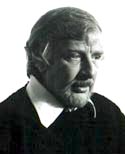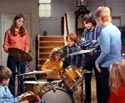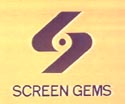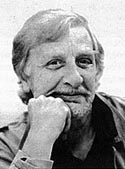









BONUS!
Read a 1972
TV Times
article about Bernard Slade!

Continued...
GH: When you did visit the set, what was the atmosphere like?
BS: I've heard Susan Dey talk about this. The show had kind of a familial feeling on the set. I gather Shirley was very good with them all, especially Danny. Actually, Danny was quite close to Dave Madden. He had that weird sense of humor that I think Danny had, too. They seemed to get along very well. Plus, when you are on a show for that long, you feel that you own that soundstage. I think that many guest starts coming in on a one-shot basis are sometimes uncomfortable because they are coming into a situation where these people have been working together all the time.
GH: Dave Madden as said he made more money off of a few commercial voice-overs than his entire four years on "The Partridge Family". What were salaries like in those days?
BS: In those days people didn't get that much. They really didn't. I remember Elizabeth Montgomery was getting something like $3000.00 a week when she started. So the astronomical fees that people are getting today didn't happen then. Even writers. Top of the line for a show was $3000.00. I have no idea what it is now.
GH: What kind of financial deal does a series' creator have?
BS: You would get a weekly residual as a creator. Today it's very different because you end up making a fortune. But in those days, you got a royalty for each episode. And money for whatever scripts you wrote, as well as the reruns. I was very highly paid and I would get $25,000 for a pilot. At one point they wanted me to sign a new contract at Screen Gems and I complained that I wasn't getting any royalties. So they offered me this large chunk of money as a consultant on "The Partridge Family". I said, "But 'The Partridge Family' has been off the air for two years!"
GH: Would you get compensated for syndication, or have a financial interest in the series?
BS: Now you are getting into very complicated bookkeeping. I think I own 25% of the profits from "The Partridge Family". I don't think I have ever seen any money from that. I own 25% of "The Flying Nun" too, and I haven't seen a cent from that either. Series creators at the smaller studios, like Danny Thomas or MTM, cleaned up. They really did see their money. But at the larger studios, it's the most creative writing in Hollywood.
GH: You stayed and wrote scripts for "The Partridge Family", but other series creators, such as Sol Saks ["Bewitched"] didn't return. Why is that?
BS: Well, he was kind of eased out of that. He was lucky, though because I think Danny Arnold [who later created "Barney Miller" – ed.] did a lot of re-writing on that. Sol had nothing to do with the series after that, and I don't know what his deal was – he probably got a royalty from that. He hasn't written anything since, and he has lived very well.
GH: Since you did stay a while, was it frustrating to see the show or characters going in a direction that you didn’t originally perceive?
BS: Yeah, except the idea of having to write for the same characters every week wasn’t too appealing either. That’s why I went to the theatre. As a writer [writing the same characters for the same show every week], the boredom factor must be enormous! My boredom threshold was very low. Even as a viewer, I get kind of tired.
GH: The instability in television must be frustrating as well.
BS: I really put a lot into "Love On A Rooftop" and it was a terrific show. It was a charming, funny show and was much better than "That Girl". We even got a better rating than "That Girl", yet they got picked up and ran for 5 years and we got cancelled. I thought it was ridiculous to spend so much time on something like that again. By doing pilots, your time is your own. As story editor, you have to be in the studio every day rewriting other people’s material and you are sitting in story conferences every day. When I wrote pilots, I would be in Europe some of the time and they wouldn’t know where I was – and didn’t care because they knew the material would always come in. It was a much easier life.
GH: To wrap up: Which do you feel is your best series?
BS: I think it was "Love On A Rooftop". We had a wonderful lead actor, Pete Duell, and a terrific supporting cast, too. It was a charming show about a young married couple and it was funny and reasonably intelligent. I think some of the earlier Bewitched episodes – the ones in black & white – were quite sophisticated. When Danny Arnold was on the show, which was during the first year, he was difficult for a lot of writers to deal with, but he cast incredibly well and he would fight for people. He was the one that set that show up.
GH: What do you feel is your best work overall?
BS: My best work is in the theatre. It’s hard to say which one, because I have written 15 plays. "Same Time Next Year" was the most successful. I also wrote a show with Jack Lemmon called "Tribute" that I thought was very good and wrote another show called "Romantic Comedy" that Mia Farrow and Tony Perkins did that was quite well received. The work I am most proud of is from the theater. Broadway is where I always wanted to be. I always felt that my Hollywood thing was like a hiatus – though it put me on my feet financially, and gave me the freedom to go out and write plays.
Cmongethappy.com would like to thank Mr. Slade for taking the time to talk to us and giving us a detailed account of the early days of Screen Gems and the creation of "The Partridge Family". While many people have asked us, "What happened to Mr. Partridge?", the answer seems obvious: "Absolutely nothing! His name is Bernard Slade."
©2000 Scott Awley for www.cmongethappy.com and respective copyright holders (photos). All rights reserved. No portion of the text of this article may be produced in any form without the written permission of the author.
Back to People and Places